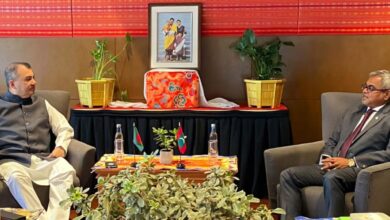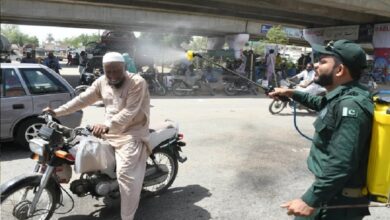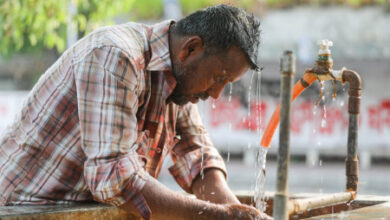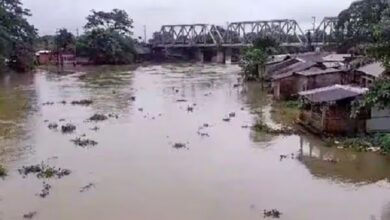Climate security or bust: The choice is regional cooperation or chaos
Cooperative engagement is the only sustainable solution to climate change hazards

Sudeep Chakravarti : Security and foreign policy talk-fests in Dhaka, as in other South Asian capitals, are often hogged by long-retired diplomats and long-retired armed forces officers who inhabit in-my-time warps even as the world has moved on.
So, a Dhaka talk-shop earlier this week for a discussion on “Emerging Security Challenges” in South Asia and to hear learned presentations that even the bores failed to hijack — in particular one on multiple levels of security seen through the lens of Bangladesh and the attendant climate crisis — was a welcome change.
Indeed, Bangladesh is at the core — it is the crucible — of how the region best described as Eastern South Asia, largely a cling wrap of a vast hinterland along Bangladesh’s 4,000 km-plus border with eastern India; with Nepal and Bhutan in the northern periphery; China insistently over the horizon; and Myanmar currently a chaos to the east and southeast, will manage the coming decades.
If it all works out, great. With Bangladesh as its robust socio-economic heart, Eastern South Asia will thrive with cooperative planning, economic interdependence, interconnectedness, and mutual respect.
If not, the collective dynamics of politics alongside manmade impulses such as the climate crisis and migration can lead to an implosion of such intensity that it can redraw maps and crash futures. (Just one disturbing statistic among many: A conservative estimate by World Bank places “climate migrants” within Bangladesh alone at over 13 million by 2050; for South Asia, the conservative estimate is 40 million.)

Ergo, it’s well past the time that security is viewed as collective, 360-degree well-being, rather than the limited application of security through acquisition of weapons and training personnel to use them. That is at the heart of perception changes wrought by climate change which has for some time brought about increasing appreciation that food security and livelihood security, among other aspects, are integral to overall security. Interwoven policy and advocacy, which places military aspects alongside other aspects instead of above them, is the smart present and smarter future.
I had the opportunity to first present such thoughts in a lengthy position paper for the Kesroli Group, a now-disbanded think-tank comprising globally-known CEOs, entrepreneurs, technocrats, and senior policymakers of Indian origin. The matrices of China and India, Bangladesh and India, and the ethno-political dynamics of North-East India made for an incendiary historical and geopolitical mix even without adding inputs by nature — I posited to that audience during a weekend retreat at the sprawling campus of Infosys Limited in Mysuru. This was back in 2009.
What would happen if Bangladesh were to suffer a series of cataclysmic storms and inundation of its coastline besides ongoing climate change-related factors such as increased salinity of water and soil? Like the inward migration forced by a similar inundation of the Indian coastline, in Bangladesh food insecurity and livelihood insecurity would lead to citizens literally forcing their way to every other point of the compass to escape that country’s deeply vulnerable south.

What if India stood by and watched this happen without also recognizing that 54 rivers from India decanted into Bangladesh. That rainfall, land use and misuse, forestation and deforestation, and benign or malign politics, directly affected this population-dense “downstream” country?
A step beyond this unchecked pressure-cooker situation would be for people to radiate to every other point of the compass in the region. No border fencing on earth could prevent the force of migration driven by survival. The Radcliffe Line could be undone by radically changed futures, not religion. Maps could again change.
And, how much would such developments tip China’s hand and move it to secure its southern borders, even if that meant effectively moving that border further south — deeper into Eastern South Asia?
It is now 2023, and I stand by those alarm bells. Only last year, at a major event in India to celebrate Bangladesh’s 50th anniversary of independence and in the presence on the dais of a former Indian high commissioner to Bangladesh and a Bangladeshi media baron, I repeated the plea for bilateral and regional cooperation through the lens of mitigating climate crises. This, or all hard-won gains of the past decades — Bangladesh’s remarkable growth, besides remarkable bilateral and regional impetus — would dissipate.
Mitigation and co-operation remain the only future. For that, India has to resolutely stand by Bangladesh and its socio-economic ambitions, to partner Bangladesh, to contribute to securing Bangladesh, to secure mutual futures. Take just one example of river waters: Beyond sea change — literally — come on board for solving water-related disputes. Save the Teesta, and all who depend on the Teesta, from twisted politics. View the Ganga-Padma as a trilateral entity alongside Nepal, the country whose tributaries greatly contribute to that river system. Reduce suspicion in India that China will turn off the tap of the Brahmaputra’s headwaters in Tibet — and risk adding downstream trouble for Bangladesh, a country through which this river travels north-to-south to decant into the Bay of Bengal. Separate paranoia from justified concern.
Several non-governmental organizations in the space of sustainable development, environment, climate crisis mitigation, and demographics in Bangladesh, India, and elsewhere in the region are collaborating with research and advocacy related to such regional and sub-regional application. They need government and private-sector support to continue, to scale up.

For its part, Bangladesh is doing commendable work with salinity-resistant varieties of rice and creating floating agricultural plantations, to name just two of several initiatives to mitigate crises. A Bangladeshi architect has received a major global award for her flood-resistant housing modules. Examples, both non-government and government initiatives, increase each year.
A future-orientation can be provided Bangladesh’s 100-year Delta Plan that is truly regional in scope, and approved by the National Economic Council chaired by the prime minister in 2018 — alongside acknowledgement that the plan cannot remain fixed in its touchpoints but needs to continually adapt to climate realities and the needs of the people.
Governments of the region must resolutely support transnational mitigation, go beyond glib talk at showy summit meetings.
Cooperative engagement over climate crises remains the greatest security net. South Asia — Eastern South Asia — cannot afford silos. The alternative is demographic and political chaos that will traverse every shore, every border, and consume our collective futures.
Sudeep Chakravarti is Director, Center for South Asian Studies at University of Liberal Arts Bangladesh. He has authored several books on history, ethnography, conflict resolution, and Eastern South Asia. His most recent book is ‘The Eastern Gate: War and Peace in Nagaland, Manipur and India’s Far East’ (Simon and Schuster).




